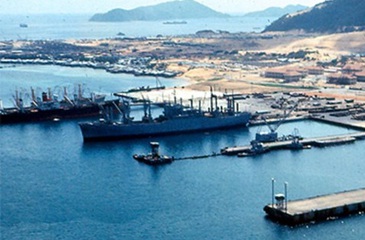
Some 38 years since they left and 16 years since a US admiral travelled to Hanoi to declare 'I'm always on the lookout for a good port', the US navy has finally returned to Vietnam's Cam Ranh Bay.
In a little-noticed move expected to resonate in Beijing, supply ship USNS Richard E. Byrd anchored in Cam Ranh's deep natural harbour on Thursday last week for seven days of maintenance.
The US navy built Cam Ranh Bay into a vast air and sea base during its long war with Vietnam, only for a victorious Hanoi to hand it over to their Soviet patrons in the late 1970s as relations with Beijing degenerated into conflict.
<!>
Moscow built a major listening post and a submarine base, with the last Russians leaving in 2002.
Vietnamese Prime Minister Nguyen Tan Dung announced last October that Cam Ranh Bay port facilities would be expanded and opened for use by foreign navies, rented at market prices. His announcement was widely seen by regional envoys and analysts as Hanoi's latest hedge against China's military rise in the South China Sea.
The giant runways at Cam Ranh - once equipped to land B-52 bombers - now serve tourists heading to the beach resort of Nha Trang, but Vietnamese planners have decided that parts of the bay will remain in military hands.
The Byrd, repaired in a nearby bay last year, is part of the Military Sealift Command - a network of large civilian-manned vessels that re-supply US naval ships at sea with ammunition, food and fuel.
It is the third such ship to be repaired by Vietnam's modernising network of shipyards - the start of what is expected to be a growing trend as the former enemies forge a partnership in the face of China's rise.
Russia, another frequent visitor to Vietnamese ports in recent years, is set to help Vietnam upgrade facilities in Cam Ranh Bay to suit foreign navies. As well as ships and planes, Moscow is also selling Vietnam six state-of-the-art Kilo class submarines. They are expected to be based at Cam Ranh, with the first vessel due to arrive in 2014.
A command statement acknowledged the symbolic importance of the Byrd's visit and the importance of Cam Ranh Bay in being able to handle such large, heavy ships. The Byrd displaces more than 41,000 tonnes of water.
'Working at Cam Ranh Bay provides the US navy with an additional option to repair our ships efficiently and in a cost-effective manner,' said the command's Lieutenant Commander Mike Little.
Professor Carl Thayer, a veteran Vietnam scholar at the Australian Defence Force Academy, described the move as significant.
'It's another very cunning piece of Vietnamese military diplomacy,' he said.
'Of course, the US returning to Cam Ranh is a major symbol in itself, but this is also done in such a way that China cannot really complain too much about it. Vietnam has already pledged to improve military relations with China and a range of other countries,'
'There are no bases, no alliances... but they are slowly and steadily expanding the military and strategic relationship with the US on various fronts in a way that looks sustainable and China will have to learn to live with, even if it is uncomfortable.'
Chinese, US, Indian and Russian ships have all visited Vietnamese ports over the last 18 months.
Không có nhận xét nào:
Đăng nhận xét